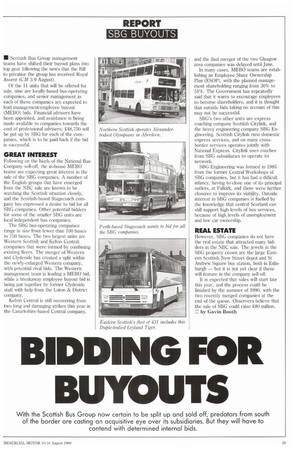REPORT SBG BUYOUTS
Page 41

If you've noticed an error in this article please click here to report it so we can fix it.
MI Scottish Bus Group management teams have shifted their buyout plans into top gear following the news that the Bill to privatise the group has received Royal Assent (CM 3-9 August).
Of the 11 units that will be offered for sale, nine are locally-based bus-operating companies, and senior management in each of these companies are expected to lead management/employee buyout (MEBO) bids. Financial advisers have been appointed, and assistance is being made available to companies towards the cost of professional advisers; £48,750 will be put up by SBG for each of the companies, which is to be paid back if the bid is successful.
Following on the heels of the National Bus Company sell-off, the in-house MEBO teams are expecting great interest in the sale of the SBG companies. A number of the English groups that have emerged from the NBC sale are known to be watching the Scottish situation closely, and the Scottish-based Stagecoach company has expressed a desire to bid for all SBG companies. Other potential bidders for some of the smaller SBG units are local independent bus companies.
The SBG bus-operating companies range in size from fewer than 100 buses to 750 buses. The two largest units are Western Scottish and Kelvin Central: companies that were formed by combining existing fleets. The merger of Western and Clydeside has created a split within the newly-enlarged Western company, with potential rival bids. The Western management team is leading a MEBO bid, while a breakaway employee buyout hid is being put together by former Clydeside staff with help from the Luton & District company.
Kelvin Central is still recovering from two long and damaging strikes this year in the Lanarkshire-based Central company, and the final merger of the two Glasgow area companies was delayed until June.
In many cases, MEBO teams are establishing an Employee Share Ownership Plan (ESOP), with the planned management shareholding ranging from 30% to 51%. The Government has repeatedly said that it wants to encourage employees to become shareholders, and it is thought that outside bids taking no account of this may not be successful.
SBG's two other units are express coaching company Scottish Citylink, and the heavy engineering company SBG Engineering. Scottish Citylink runs domestic express services, and on many crossborder services operates jointly with National Express. Citylink uses coaches from SBG subsidiaries to operate its network.
SBG Engineering was formed in 1985 from the former Central Workshops of SBG companies, but it has had a difficult infancy, having to close one of its principal outlets, at Falkirk, and there were further closures to improve its viability. Outside interest in SBG companies is fuelled by the knowledge that central Scotland can still support high levels of bus services, because of high levels of unemployment and low car ownership.
However, SBG companies do not have the real estate that attracted many bidders in the NBC sale. The jewels in the SBG property crown are the large Eastern Scottish New Street depot and St Andrew Square bus station, both in Edinburgh — but it is not yet clear if these will feature in the company sell-off.
It is expected that sales will start late this year, and the process could be finished by the summer of 1990, with the two recently merged companies at the end of the queue. Observers believe that the sale of SBG could raise i'.80 million. E by Gavin Booth


































































































































